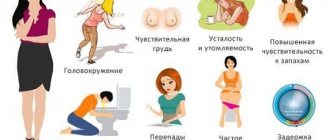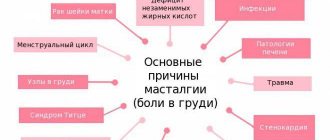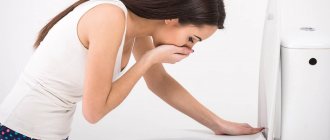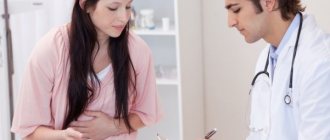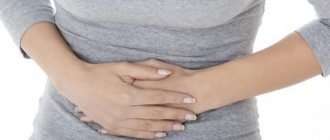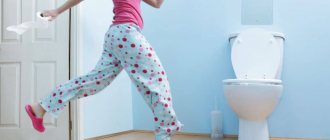Why do nipples hurt before menstruation?
The main cause of pain in the nipple area before the onset of menstruation is considered to be a lot of estrogen produced.
This hormone, produced during the ovulation period, has a profound effect on a woman’s body and her breasts.
If a woman carefully monitors her physical condition, then she has observed that during the days of the menstrual cycle her breasts significantly increase in volume and become more elastic.
These changes occur precisely due to an increase in the hormone estrogen in the body.
At moments of its increased presence, the female breast, as it were, prepares for feeding the baby, filling with blood, the result of this process is pain in the nipple area.
The violent manifestation of this premenstrual syndrome is often characterized by:
- Age category of women;
- Lifestyle;
- Health.
Cycle and breast condition
As an egg forms in the ovary, a woman’s hormonal system begins to change: more female hormones are produced, in particular estrogens. They are necessary to prepare the whole body for the upcoming pregnancy.
First of all, the uterus is prepared: the endometrium gradually grows to ensure reliable attachment of the fertilized egg. If fertilization ultimately does not occur, the mucous membrane sheds as “unnecessary” and menstrual bleeding begins.
This preparation affects not only the uterus, but also the mammary glands. Even before pregnancy, a woman's body begins to change to make breastfeeding as effective as possible in the future.
Estrogens act on mammary gland tissue, namely fatty tissue. Under the influence of hormones, it begins to grow, leading not only to an increase in breast size, but also to painful sensations. Becoming more voluminous, adipose tissue compresses blood vessels, hence the state of mild swelling. At the same time, the nipples also become more sensitive. Typically, these phenomena are observed when your period is 10 days away, plus or minus 3-4 days.
With the onset of menstruation, many women feel discomfort in the chest, nagging pain in the lower abdomen, and general malaise. Towards its completion, all unpleasant symptoms disappear, and the breasts restore their previous shape and condition. The sensations in the nipple area are also normalized. In other words, sore nipples and mammary glands before menstruation are one of the signs of premenstrual syndrome, which is not a pathology and does not lead to the development of any diseases.
Postmenstrual problems
Sometimes a woman may experience nipple pain after her period.
If her physical health is in good condition, then these sensations should not normally occur. The presence of pain in the nipples after menstruation causes observed deviations in lifestyle or physical health:
- Irregular sexual relations. If a woman does not engage in sexual relations for a long time, then an excessive accumulation of hormones occurs in her body. There are cases where the lack of sexual relations led to even more serious problems in a woman’s health than pain in the nipples.
- Nipples hurt after menstruation due to problems with the hormonal levels of the internal organs. Malfunctions of the endocrine system help to increase the production of hormones produced by the thyroid gland.
- If there is pain in the nipples before, during and after menstruation, it may indicate the development of fibrocystic mastopathy. The disease is serious and requires seeking help from a specialist.
Possible pathologies
Most of these reasons are not pathologies, but when the nipples are very sore before menstruation every time, the following pathologies may be the prerequisites:
- Hormonal imbalance - any changes in the amount of hormones lead to irregularities in the menstrual cycle.
- Malfunctions of the nervous and endocrine systems: intercostal neuralgia and adrenal dysfunction are the most serious problems with this symptom.
- Taking hormonal pills. If the prescribed contraceptives are not suitable, it is recommended to stop taking them and replace the medications with others as prescribed by the doctor.
- Stress. Nervous disorders are directly related to hormones.
- Bruises. Even a minor injury to the mammary gland has negative consequences.
A serious pathology that causes pain in the nipples before menstruation is a breast tumor. She is accompanied by certain symptoms that require an urgent appointment with a doctor.
- nipple discharge;
- nausea;
- mood swings;
- pronounced swelling;
- insomnia;
- lump in the mammary gland.
Mastopathy
Mastopathy is a neoplasm in the breast of benign origin. The most common types of disease are nodular and diffuse. At the first stage of development, the disease does not have severe symptoms. Discomfort in the mammary glands appears only before the onset of menstruation.
Ovarian dysfunction
Ovarian dysfunction is most often associated with hormonal imbalances. Therefore, the pathology primarily affects the condition of the mammary glands and pain in the nipples appears. Pain in the nipples before menstruation and menstrual irregularities are noted. Pathology is considered to be a cycle duration of more than 35 days. Causes of dysfunction include:
- nervous tension;
- inflammatory process;
- endocrine disorders;
- complication after wearing an intrauterine device;
- tumor processes;
- exposure to external factors (medication, ecology, radiation, etc.).
Mastitis is a disease of the mammary glands accompanied by inflammation. Most often, the disease occurs during the lactation period, 2-3 after labor. It is accompanied by fever, breast swelling and intense pain. Staphylococcus aureus is considered the main causative agent of mastitis. In order to eliminate the symptoms of the disease, antibacterial therapy is carried out.
Mastopathy
The disease develops due to hormonal and vascular disorders that change the ratio of glandular and stromal elements of the gland. A lump is palpable in the chest; in the 2nd phase of the cycle, dull nagging pains bother you; the mammary glands increase in volume. Clear fluid may be discharged from the nipples.
Ovarian dysfunction
The proper functioning of the ovaries depends on the state of the hypothalamic-pituitary system and the levels of two hormones - follicle-stimulating and luteinizing.
Often the cause of disorders is inflammatory or oncological processes that occur inside the ovaries. The pathology leads to nipple pain before menstruation, bleeding loses regularity or stops completely, and nagging pain occurs in the lower abdomen.
Ovarian dysfunction is dangerous for infertility and miscarriage. They increase the risk of developing endometriosis, mastopathy, polycystic disease, and breast cancer.
Mastitis is an inflammatory process that affects different parts of the mammary gland and causes pain.
Pathology promotes the penetration of microorganisms into the affected area and the development of purulent inflammation, which is accompanied by weakness, headache, and fever.
Signs of mastitis are nonspecific, so it is important to differentiate the disease from similar conditions. Symptoms that require immediate medical attention:
- Tension and soreness.
- Swelling and redness.
- Nipple discharge.
- Enlargement of regional lymph nodes.
- Increased skin temperature (breast tissue is warmer than other areas of the body).
Oncological processes in the early stages are asymptomatic.
After some time, the nipples become drawn in or itch, the breasts become deformed, and a dense knot can be felt inside. The skin of the mammary glands appears ulcerated or wrinkled. Purulent or bloody discharge comes from the nipple. When the tumor metastasizes, weakness overcomes, appetite worsens, body temperature remains at low-grade levels.
There are situations when sensitivity of the nipples and breasts is noted after menstruation, at the beginning of the cycle, and such pain is in no way related to the production of estrogen. Then it’s worth thinking about the presence of any pathology. The most common causes of pain include:
- Hormonal disorders, when estrogen production does not begin in the middle of the cycle, but can occur regardless of egg maturation. Then the breasts may be swollen and tender throughout the entire cycle.
- Irregular sex life, in which sex hormones are produced, but do not find a “way out”, thus accumulating in the body and causing hormonal imbalances.
- Endocrine diseases in which the balance of hormones produced by the thyroid gland is disrupted.
- Fibrocystic mastopathy is a benign lump in the breast that can occur during lactation or independently of it. There may be an increase in body temperature and severe pain in the chest and nipples.
- Infection and development of the inflammatory process in the soft tissues of the breast.
- Injuries, various blows.
- Ovarian dysfunction, including polycystic disease.
In the absence of pregnancy
These symptoms may not always indicate that pregnancy has occurred.
If after the test you receive a negative result, you must:
- The first thing is to visit a gynecologist and tell him about the troubling problem.
- The second is to establish the cause.
There may be several reasons, from the most harmless to those requiring medical treatment:
- Changes in climatic conditions. Especially if a woman lives in harsh climatic conditions, and goes on vacation closer to the burning sun, and not by train, but by plane. It is difficult for the body to readjust and there is a delay in menstruation.
- Sudden weight loss or weight gain. This reason can cause the appearance of illness, since playing with the weight of the body leaves its mark on its performance.
- Staying under stress.
- More serious causes include gynecological diseases. Uterine fibroids, cervical cancer, cysts, inflammatory processes of the genitourinary system, all of them can contribute to disruptions in the menstrual cycle.
- A woman's recent miscarriages and abortions can cause her period to be delayed from several weeks to months.
- Frequent use of contraceptives belonging to the high-urgency class. They can disrupt hormonal levels, which require some time to restore.
- Polycystic ovary syndrome. The disease is serious and timely; if you do not pay attention to it, it can cause infertility.
Third, undergo a course of treatment to eliminate the causes of missed periods, prescribed by a gynecologist.
Other factors
To determine the reason for nipple pain (menstruation or pregnancy), you need to know and hear your body well:
- Pain in the nipples is much more intense than before menstruation;
- During pregnancy, the breast itself becomes more elastic and painful with slight compression;
- Even in the first trimester of pregnancy, if you squeeze the nipple, a white liquid will be released from it - this is colostrum.
A woman may experience rapid fatigue, increased sensitivity to certain odors, and nausea in the morning, sometimes leading to vomiting. The symptoms together indicate pregnancy.
In order not to guess on the coffee grounds, it is enough to take a pregnancy test, or even better, go for a consultation with a gynecologist.
Can nipples hurt before menstruation?
An increase in breast size in combination with increased sensitivity before menstruation is considered a normal natural phenomenon. Swelling of the mammary glands is due to the natural process of gradual preparation of the female reproductive organs for gestation and potential breastfeeding.
In the middle of the cycle, there is a powerful release of hormones, as a result of which slightly swollen adipose tissue compresses the blood vessels, and the breasts become denser than usual.
The severity of symptoms depends on the functioning of the uterus. Contractions of the organ contribute to the release of the endometrium, which turned out to be useless due to the lack of fertilization. The level of estrogen levels out at the beginning of menstruation, breast pain is noticeably reduced, and swelling of the mammary glands is eliminated.
Treatment and prevention
In general, if the presence of pain in the lower abdomen, chest, nipples, head is associated with the manifestation of premenstrual syndrome, then there is nothing to treat - it is simply related to the physiology of a particular woman or girl.
But there are situations when pain interferes with thinking and working. Of course, you should take painkillers.
But you should not drink them constantly, since you can cause the body to become addicted:
- For headaches - Nurofen or analgin;
- For pain in the lower abdomen of an antispasmodic nature - no-spa (drotaverine).
The presence of pain after menstruation is a reason not to self-medicate, but to seek professional help from a specialist.
If everything is in order with the woman’s body and no deviations from the norm are observed, then the doctor prescribes a number of preventive measures to relieve pain:
- Chest pain can be significantly reduced by taking a warm bath before bed. Water procedures with sea salt and aromatic oils are considered effective.
- If you have discomfort in the lower abdomen, you should drink a herbal decoction. Brew equal amounts of thyme, chamomile, lemon balm and St. John's wort with boiling water. Leave the infusion for 20 minutes and then take it instead of a tea drink.
- If you monitor your fatigue during menstruation and do not provoke overwork, then there will be no headaches after menstruation.
The help of a specialist can defeat even cancer in its early stages.
Mastopathy and mastitis
Before menstruation, nipples may also hurt due to mastopathy. The basis of this disease is changes in the ratio of connective tissue and glandular elements. These changes may occur due to vascular or hormonal disorders and are accompanied by the following symptoms:
- Transparent discharge from the nipples (in rare situations).
- Breast engorgement (its volume increases).
- In the second half of the cycle, nagging and dull pain may be present.
- A fibrous node is a compaction that is not fused to the skin and is movable.
The reason for going to a mammologist may be discharge from the nipples (except breast milk) and lumps inside the gland. Mastopathy requires careful differential diagnosis with oncopathology.
Mastitis can also be accompanied by pain in the chest area. Inflammation can occur in any part of the mammary gland and can be caused by stagnation of breast milk (lactostasis) or the penetration of microorganisms.
The main signs of pathology are:
- Discharge from the nipples (very often they are purulent).
- Breast pain and swelling.
- Changes in skin color (it may turn red, darken or lighten).
On palpation, the mammary gland hurts, is very tense, regional lymph nodes are enlarged, and the skin temperature (local) rises.
The general condition of a woman worsens with purulent inflammation:
- Headaches become more frequent.
- There is a general feeling of malaise and weakness.
- There is a fever.
How to reduce discomfort
Pain in the nipples before menstruation can be so severe that a woman cannot sleep on her stomach or side. The slightest touch can cause pain.
This can go on for more than one day. It is worth using techniques: give the body rest, reduce stress, relax, apply heat to the stomach or take a warm bath with sea salt.
This will help reduce nipple soreness before your period:
- Avoid smoking and drinking alcoholic beverages;
- Reduce the amount of fluid you drink, which will significantly smooth out premenstrual syndrome;
- Avoid strong coffee or tea, pickled and spicy foods, and focus on vegetables and fruits; they can play a significant role in pain prevention;
- Do not overcool, avoid stress, do not take self-prescribed medications;
- Protect nipples from rough touches during intimacy;
- Wear underwear that securely holds the breasts, made from natural fabrics, without seams and in accordance with the size.
Taking painkillers such as ibuprofen, no-spa or aspirin will help relieve pain on such a day. Why you should not abuse drugs: if the pain is pathological, after taking them you can miss a serious pathology, and with constant use you will become addicted to them. It is better to take painkillers as a last resort.
Traditional methods will also help if the pain is very bothersome. Plants like soybeans, clover and raspberries contain natural phytoestrogens. And tinctures of nettle, St. John's wort and string will have a calming and analgesic effect after their use.
Sometimes pain can be relieved simply by relaxing.
How to eliminate pain
When the cause of the discomfort is determined, you can begin to alleviate the painful condition. If there are serious pathologies, the doctor will prescribe appropriate medications; it would be useful to take additional measures:
- buy a comfortable bra without seams;
- Swelling under the nipple before menstruation can be relieved by applying a warm heating pad to the breast before bed;
- taking baths with the addition of aromatic oils;
- normalization of diet;
- No-shpa and Ibuprofen tablets will help reduce pain.
You should not wash your nipples with soap - this will make them dry and contribute to cracks.
The drug Pentalgin will help relieve pain
Advice from gynecologists
Nipple pain should go away on its own after your period ends. If this does not happen, then you should think about pregnancy more often.
Climate change, stress, and sudden changes in weight can affect it. If all these reasons are excluded, then disturbances in the functioning of the body can be suspected.
Such problems are also worth thinking about for those women whose pain has changed in nature, its intensity or pain has simply disappeared. In general, women who have not had it before menstruation should also pay attention to pain in the nipples.
You should also be concerned about pain in the nipples before menstruation if there is a change in the course of the menstrual cycle. If a similar situation is repeated several times, this will be another reason to contact a specialist.
When you need to see a doctor urgently
You can try to eliminate sore nipples at home, but only if there are no other signs indicating the disease. This can be done if there is confidence that friction provoked the pain.
If the intensity of the pain increases and it becomes unbearable, it is recommended to consult a doctor. A similar reaction should occur to pain for no apparent reason, the duration of which exceeds 72 hours.
If nipple pain bothers a nursing mother, you should consult a pediatrician. It is recommended to consult a doctor if growths appear, or if the pain bothers you on one side.
The main indications for seeking medical help are:
- pain of a constant nature, the intensity of which increases;
- the appearance of pathological discharge from the nipple if the woman does not breastfeed;
- rash elements, hyperemia and swelling of the areola;
- change in color and shape of the nipple, formation of cracks and erosions.
Recommended monthly from days 6 to 12 of the menstrual cycle:
- Examine the shape of the breasts, nipples, and their color in front of the mirror.
- Raise your hands up and examine your chest from the front and both sides.
- Using pressing movements, feel the chest with three middle fingers, starting from the upper outer quarter and moving clockwise. In this case, you need to pay attention to the presence of discharge from the nipple.
- Continue the examination in a lying position, palpating each quarter of the breast.
- Feel the lymph nodes in the armpit area with your fingers.
It is important to undergo preventive examinations with a gynecologist every 12 months. If you have nipple pain, you need to make an appointment with a gynecologist. He will conduct a manual examination, collect anamnesis and refer you for tests.
The doctor may recommend contacting a mammologist who will do a mammogram to identify good and malignant formations in the breast. In special cases, a biopsy is performed. When diagnosing a hormonal imbalance, you should go to an endocrinologist.
Nipple discharge
Sometimes women notice discharge from the nipples unrelated to lactation. The reason may be related to hormones, when before menstruation the body intensively produces progesterone and estrogen. Such discharge has a cloudy white color, translucent, and odorless. They end with the arrival of menstruation.
If the discharge occurs on a constant basis, is accompanied by severe pain, changes in the shape of the breast, and the nipples itch or change color, this is a reason to consult a doctor. Bloody discharge is especially dangerous.
Sometimes women complain to the gynecologist that they are bothered by discharge from the nipples before menstruation. Their presence can be recognized by spots of different sizes and structures on the inside of the bra. These traces are left by fluid from the milk ducts in the breast, which is produced under the influence of progesterone and estrogen. These sex hormones are involved in preparing the female body for possible pregnancy and feeding future offspring with mother's milk.
Usually, when the fertilized egg ripens, this fluid goes back through the ducts into the vascular bed, but if the breasts are very swollen, then in the middle of the menstrual cycle the absorption process slows down, and excess fluid comes out and leaves a mark on the underwear. This substance does not have a characteristic odor; it has a pale, cloudy color. Additionally, excessive physical activity or emotional stress can cause these discharges.
In most cases, nipple discharge does not pose a danger to a woman, but there are a number of conditions in which you should definitely consult a doctor:
- if the nipples darken. Darkening of the nipples in itself is not a dangerous symptom; you need to be wary when the skin around the nipple becomes inflamed and itchy;
- if discharge from the chest occurs regardless of the day of the menstrual cycle on an ongoing basis, it comes out on its own without pressing on the chest;
- if, in addition to discharge, pain appears in the chest, its shape changes, and bloody impurities appear in the fluid released from the nipples.
Even if discharge from the mammary glands does not cause discomfort, you should consult with your doctor about the admissibility and normality of such processes at the current moment of the menstrual cycle.
Difference between pain in men and women
Breast pain is more often diagnosed in women. Men should not have sore nipples; such a symptom may indicate an increase in the level of female hormones (this occurs in adolescence) or a disease.
After birth, the breasts of boys and girls are the same, but over time, during puberty, girls experience swelling of the mammary glands and their development. In boys at this time, the levels of male and female sex hormones are constantly changing.
Pain in the nipples may occur when the pituitary gland is malfunctioning. If symptoms such as hardening of the glands, purulent discharge from the nipples, and pathological sensations are not observed, they will go away on their own.
However, there are a number of diseases that are accompanied by pain in the nipples and require treatment, these may be:
- Gynecomastia is caused by dysfunction of the liver, kidneys, testicles, and endocrine glands. There is a decrease in the level of production of male sex hormones. False gynecomastia can be diagnosed if you are overweight, when there is an increase in breast volume.
- Diabetes. The disease is accompanied by a disruption of the hormonal system, which negatively affects the condition of the entire body.
- Attachment of infection.
- Breast or nipple cancer. It is diagnosed in men very rarely, more often after 60 years.
Causes of nipple pain in men
The mammary glands in men and women have a similar structure. And the pathology of this organ in men also has similarities with female breast diseases. Swelling and tenderness of the mammary glands in men is called gynecomastia.
Risk factors for gynecomastia:
- obesity;
- diabetes;
- mammary gland injuries;
- adolescence;
- alcoholism;
- liver diseases;
- burdened heredity.
Diagnosis of this disease is carried out by an endocrinologist. Treatment of gynecomastia is hormonal and symptomatic. In some cases, surgery may be appropriate.
Breast cancer can affect the breasts in men. The clinical picture of a man’s disease develops rapidly and requires immediate treatment. The risk group for breast cancer includes men taking anabolic steroids to increase muscle mass.
Why do teenagers' nipples hurt?
Often girls in adolescence complain of discomfort in the chest; they may notice it while taking a shower or sleeping on their stomach. This phenomenon is considered physiological and temporary, so there is no need to panic.
During the growth of glandular tissues, seals form under the areola; pressing on them can also lead to pain similar to those that appear when pressing on a bruise.
The mammary glands are a delicate and sensitive part of the human body, so discomfort appears there.
Soreness can appear before the onset of menstruation, then girls learn to cope with it with the help of gymnastic exercises or medications. Another reason is wearing underwear or clothes of the wrong size, made from low-quality fabrics.
In teenage boys, pain may appear during puberty due to increased levels of female hormones. Typically, relief occurs over time; the situation does not require outside help. In rare cases, symptoms may indicate diseases or dysfunction of the pituitary gland.
Other reasons
Periodically occurring discomfort in the nipples may be the result of a purely mechanical effect on the breast.
- So, if a woman chooses the wrong bra - it is made from poor-quality fabric, squeezes the glands, pulls and pinches - irritation of the nipples is likely to occur very quickly.
- Rubbing your chest too vigorously after a shower with a hard towel can cause discomfort.
- Excessively intense breast massage is another cause of pain.
- The condition of the nipples is also affected by the use of various caring cosmetics. First, you need to evaluate the soap and shower gel used daily: they may be very drying to the skin, which leads to microscopic cracks and severe irritation of the delicate skin of the nipple, which may cause pain for a woman when moving or touching. Further, creams, ointments, rubs and other breast skin care products, including medicinal ones, can cause allergies. For this reason, experts advise carefully monitoring your skin's reaction to new cosmetics.
- Soreness of the nipples and breasts at any time can be affected by a change in environment, in particular climatic conditions. If a woman lived for a long time in a country with a cold climate, and then came to a hot southern state, the hormonal system may have a slight disruption. Gradually, the background will be restored, and discomfort and cycle disturbances will disappear.
- In the same way, stress and strong feelings, sudden changes in weight can have an effect - losing weight or, conversely, increasing body weight.
Top medications to reduce nipple pain, painkillers
For mastalgia caused by menstruation, the use of acetaminophen (Paracetamol) or other non-steroidal anti-inflammatory drugs is considered justified.
In case of excessively intense pain, it is recommended to take a course of treatment with drugs such as Danazol, Tamoxifen. These medications suppress the production of estrogen and progesterone. In this case, it is important to clarify whether the woman is taking medications containing these hormones.
For nipple pain associated with childbearing, it is recommended to wear a support bra and take acetaminophen (Paracetamol).
The most effective are drugs belonging to the group of selective NSAIDs. Their advantage is that they provide a selective effect without harming healthy organs.
The main representatives are:
- Nimesulide – quickly eliminates pain, manifestations of inflammatory processes, skin hyperemia;
- Flamax – has a pronounced antipyretic, anti-inflammatory, anti-aggregation effect;
- Celebrex – effectively eliminates the manifestations of pain.
Preventative measures to avoid nipple pain
To prevent the appearance of discomfort in the nipples, it is recommended:
- reduce the amount of caffeine consumption;
- minimize fat intake, their amount should not exceed 15% of total calories;
- choose a comfortable bra made from natural fabrics, preferably a sports bra;
- apply an anesthetic gel locally, usually such drugs are made on the basis of non-steroidal anti-inflammatory drugs;
- enrich your diet with multivitamins, special attention should be paid to vitamin E.
